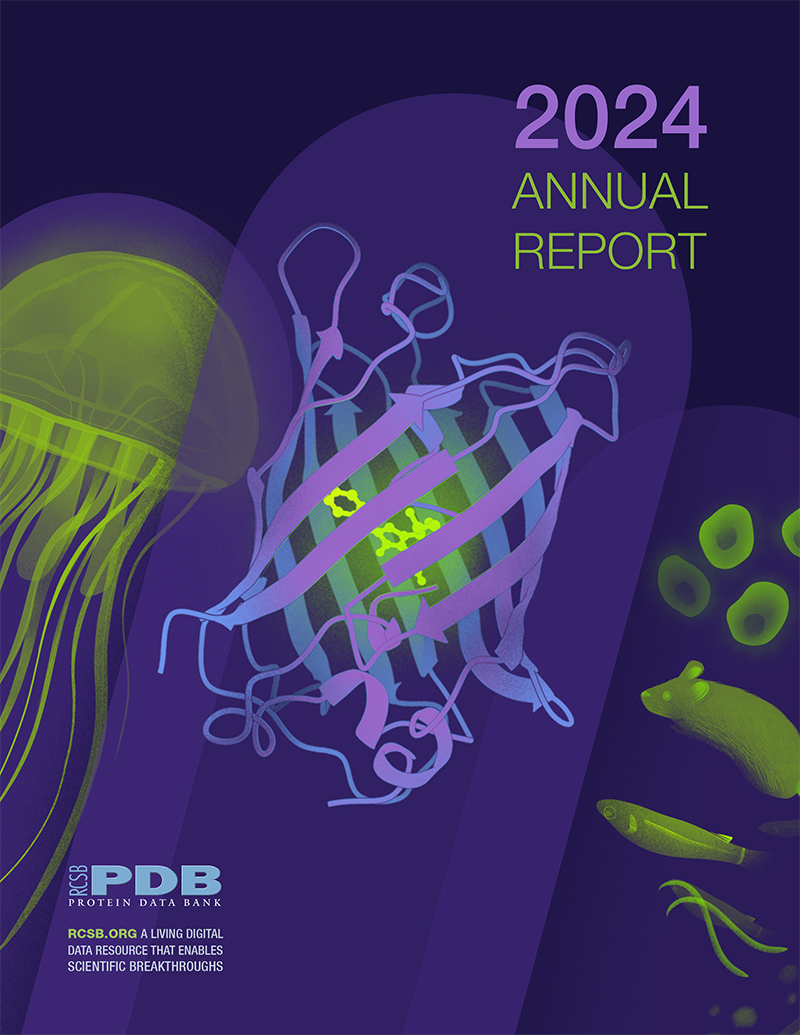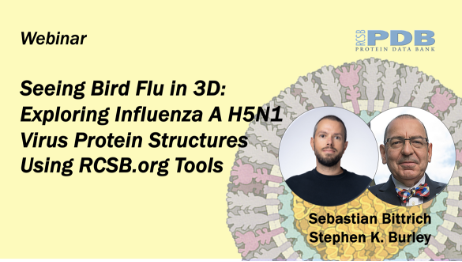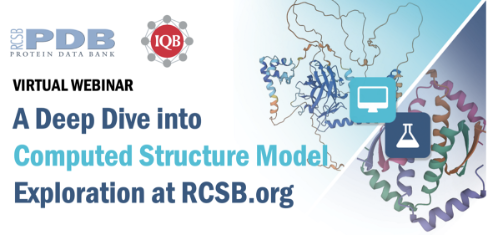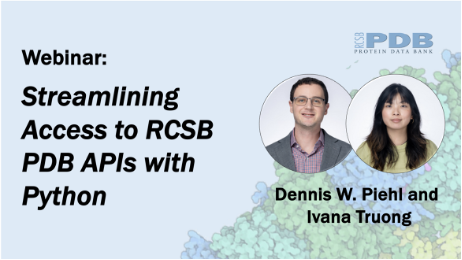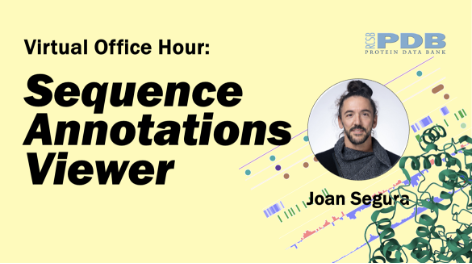Training, Outreach, and Education 
Annual Report Published
Download the 2024 Annual Report (PDF) for an overview of recent Deposition/Biocuration, Archive Management/Access, Data Exploration, and Training, Outreach, and Education activities.
This review also highlights the global impact of PDB data and RCSB PDB services.
The cover image was created by science communication intern Xinyi Christine Zhang (Harvard) as part of a series of posters that celebrate the science made possible by the NSF and RCSB PDB.
These bulletins provide a yearly snapshot of RCSB PDB activities and the state of the PDB archive.
Watch Webinars and Office Hours at PDB-101
Recordings and related course materials of RCSB PDB training events are published at PDB-101. Highlights include:
Exploring Influenza A H5N1 virus protein structures using RCSB.org tools.
- Understand the basics of influenza A H5N1 virus
- Identify influenza-related PDB structures and Computed Structure Models for research
- Learn how to align structures for analysis
- Search the PDB archive by structural motif
- Gain hands-on experience using RCSB.org tools
Deep Dive into Computed Structure Model Exploration at RCSB.org
- Browse Annotations to find relevant PDB Structures and related Computed Structure Models
- Group search hits to get non-redundant results
- Explore sequences in 3D context
- Align and analyze multiple related 3D structures
- Search structures by Sequence and 3D Structure similarity
- Use Structure Motif search
Streamlining Access to RCSB PDB APIs with Python
- Automate advanced search and data retrieval from RCSB.org
- Learn the fundamentals of RCSB PDB’s Search and Data APIs and use-cases
- Use Python for searching and fetching macromolecular structure data from RCSB.org
- Integrate RCSB PDB APIs into data workflows using a simplified Python interface
Sequence Annotations Viewer Office Hour
The Sequence Annotations Viewer provides graphical summaries of PDB protein biological and structural features and their relationships with UniProtKB entries.
Structural features such as secondary structure, angle/distance outliers, protein-ligand binding sites or disulfide bridges, are extracted from the PDB structural data. Additionally, structural domains are annotated from CATH and SCOPe databases. Biochemical and biomedical features are collected from the UniProtKB database and mapped onto PDB sequences.
PDB-101 hosts different Training Events and a specialized Guide to Understanding PDB Data.
Sign up to receive email notifications about upcoming training courses and events.
Recent Publications
A new chapter for Molecule of the Month
The online Molecule of the Month series authored by David S. Goodsell and published at PDB101.RCSB.org has highlighted stories about the biomolecular structures driving fundamental biology, biomedicine, bioenergy, and biotechnology since January 2000.
A new chapter begins in 2025: Janet Iwasa has taken over as the series creator of stories about critically important biological macromolecules in a rapidly changing world.
A new chapter for RCSB Protein Data Bank Molecule of the Month in 2025
Janet Iwasa, David S. Goodsell, Stephen K. Burley, Christine Zardecki
(2025) Structural Dynamics 12: 021101 doi:10.1063/4.0000302
This transition was also described in Molecule of the Month: Celebrating 25 Years of Storytelling and Announcing New Beginnings in the January 2025 RCSB PDB Newsletter Education Corner.
Visualizing and analyzing 3D biomolecular structures using Mol*
Read how Mol* can be used to visualize and analyze the influenza A H5N1 virus proteome
Visualizing and analyzing 3D biomolecular structures using Mol* at RCSB.org: Influenza A H5N1 virus proteome case studyThe supplementary material (PDF) provides instructions for recreating most of the visualizations from the main manuscript, along with additional details where needed.
Sebastian Bittrich, Alexander S. Rose, David Sehnal, Jose M. Duarte, Yana Rose, Joan Segura, Dennis W. Piehl, Brinda Vallat, Chenghua Shao, Charmi Bhikadiya, Jesse Liang, Mark Ma, David S. Goodsell, Stephen K. Burley, Shuchismita Dutta
(2025) Protein Science 34: e70093 doi:10.1002/pro.70093
PDB and a transformative impact on science and society
Read how freely available, atomic-level, 3D biostructure data stored in the PDB impact biology and medicine. The article also includes a look at PDB impact on regional, US, and global economies.
Protein Data Bank (PDB): Fifty-three years young and having a transformative impact on science and society
Helen M. Berman and Stephen K. Burley
(2025) Quarterly Reviews of Biophysics58: e9 doi:10.1017/S0033583525000034
Poster Prize Awarded at ASBMB
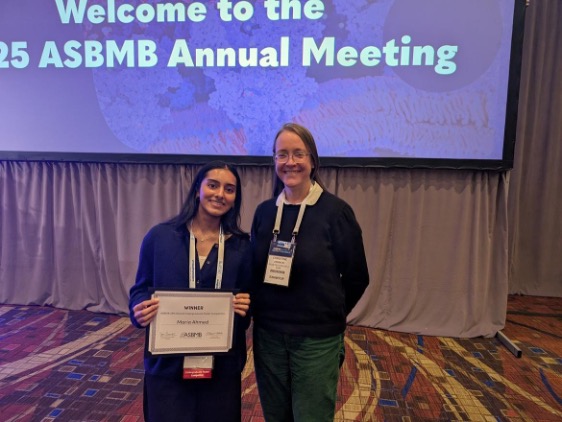
Maria Ahmed (University of Rochester) and Christine Zardecki (wwPDB Foundation)
The wwPDB Foundation made an award for outstanding student presentation at the 2025 meeting of The American Society for Biochemistry and Molecular Biology (April 12–15; Chicago, IL).
Incorporation of methionine sulfoxides into nascent proteins during translation
Maria Ahmed, Philip Bellomio, Michael Meadow, Kevin Welle, Kyle Swovik, Jenny Hryhorenko, Sina Ghaemmaghami, University of Rochester
Many thanks to The Biophysical Society organizers and poster prize judges for making this award possible.
The wwPDB Foundation was established in 2010 to raise funds in support of the outreach activities of the wwPDB. The Foundation raised funds to help support PDB50 events, workshops, and educational publications. The Foundation is chartered as a 501(c)(3) entity exclusively for scientific, literary, charitable, and educational purposes.
The wwPDB Foundation is grateful for our industrial sponsors: Discngine and MiTeGen. Individual sponsorships are also available.
Consider supporting the next 50 years of PDB's spirit of openness, cooperation, and education with a donation to the wwPDB Foundation.
